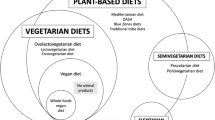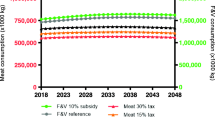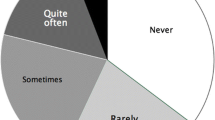Abstract
Nutrition has long been a contentious policy area. It lends itself to either social control or social emancipation. There is strong evidence for the 21st century action to promote population-based health. Developing and developed countries face significant diet-related problems, costly in both human and financial terms. Tim Lang and Michael Heasman caution that westernized patterns of eating are taking root, while strong forces seek an individualized rather than ecological public health approach to health. They argue that in new political era of nutrition, in which developing and developed worlds will increasingly share experiences, good and bad, and new alliances must be formed in order to promote the common good.



Similar content being viewed by others
References
Barker D. (1992) Fetal and Infant Origins of Adult Disease, London: British Medical Journal Publications.
Barker D. (2003) The Best Start in Life, London: Century.
Barling D. and T. Lang (2003) Codex, the European Union and Developing Countries: an analysis of developments in international food standards setting Report to Dept for International Development. London: City University Institute of Health Sciences.
Boon T. (1997) ‘Agreement and Disagreement In the Making of World of Plenty', in David F. Smith (ed.)’, Nutrition in Britain: Science, scientists and politics in the twentieth century 1–189, London: Routledge.
Boseley S. (2004) ‘US Accused of Sabotaging Obesity Strategy’, The Guardian January 16.
Boyd Orr J. (1943) Food and the People Target for Tomorrow No 3 London: Pilot Press.
Boyd Orr J. (1966) As I recall, London: Macgibbon and Kee.
Caballero B. and B.M. Popkin (eds.) (2002) The Nutrition Transition: Diet and Disease in the Developing World, London: Academic Press.
Cannon G. (1988) The Politics of Food, London: Century.
CSPI (2004) ‘Bush Administration Trying to Bury WHO Obesity Report’, Press Release, Washington DC: Center for Science in the Public Interest, January 16.
Egger G. and B. Swinburn (1997) ‘An ‘Ecological’ Approach to The Obesity Pandemic’, British Medical Journal 315: 477–480.
Heasman M. and J. Mellentin (2001) ‘The Functional Foods Revolution’. London: Earthscan.
Hirschhorn N. (2002) ‘How the Tobacco and Food Industries and their Allies Tried to Exert undue Influence Over FAO/WHO Food and Nutrition Policies’, unpublished report to WHO, New Haven, Connecticut, June 19.
Jacobson M. and M. Nestle (2000) ‘Halting the Obesity Epidemic: A public health policy approach’, Public Health Reports 115: 12–24.
Labonte R. (1998) ‘Healthy public policy and the World Trade Organisation: A proposal for an international health presence in future world trade/investment talks’, Health Promotion International 13(3): 245–256.
Lang T. (1996) ‘Food Security: Does it conflict with globalization?’, Development 4: 45–50.
Lang T. (1999) ‘The new GATT Round: Whose development? Whose health?’, Journal of Epidemiology and Community Health 53: 681–682.
Lang T. and Michael Heasman (2004) Food Wars: The global battles for mouths, minds and markets, London: Earthscan.
Marsden Terry., A. Flynn and M. Harrison (2000) Consuming Interests: The social provision of foods, London: UCL Press.
Millstone E. and Tim Lang (eds.) (2003) The Atlas of Food, London: Earthscan/New York: Penguin.
Murray, J.L. Christopher and Alan D. Lopez (eds.) (1996) The Global Burden of Disease: a comprehensive assessment of mortality and disability from diseases, injuries and risk factors in 1990 and projected to 2020, Cambridge MA: Harvard School of Public Health on behalf of the World Health Organization and the World Bank.
Nestle Marion. (2002) Food Politics, Berkeley CA: University of California Press.
Marmot M. and Richard G Wilkinson (eds.) (1998) The Social Determinants of Health, Oxford: Oxford University Press.
Popkin B.M. (1999) ‘Urbanisation, Lifestyle Changes and the Nutrition Transition’, World Development 27(11): 1905–1915.
Stein R. (2004) ‘U.S. Says It Will Contest WHO Plan to Fight Obesity But Claim of Faulty Science is Rejected by Nutritionists’, Washington Post 16 January A03.
Trowell H. and D. Burkitt (eds.) (1981) Western Diseases: Their emergence and prevention, London: Edward Arnold.
Tudge C. (2003) ‘And So Shall We Reap’. London: Penguin.
Walker C. and G. Cannon (1986) ‘The Food Scandal’. London: Century.
WHO-E (1988) Healthy Nutrition: Preventing nutrition-related diseases in Europe, Copenhagen: World Health Organization Regional Office for Europe, European Series, no 24.
WHO (1990) Diet, Nutrition and the Prevention of Chronic Diseases, Technical Report Series 797, Geneva: World Health Organization.
WHO (2002a) World Health Report 2002, Geneva: World Health Organization.
WHO (2002b) Press Release WHO/84, October 29.
WHO and FAO (2003) Diet, Nutrition and the Prevention of Chronic Disease, Technical Report Series 916, World Health Report 2003. Geneva: World Health Organization.
Rights and permissions
About this article
Cite this article
Lang, T., Heasman, M. Diet and Nutrition Policy: A clash of ideas or investment?. Development 47, 64–74 (2004). https://doi.org/10.1057/palgrave.development.1100031
Published:
Issue Date:
DOI: https://doi.org/10.1057/palgrave.development.1100031




